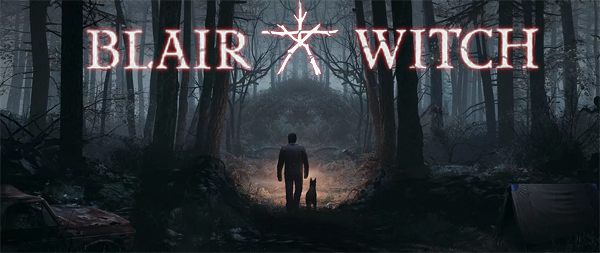
In my review of Blair Witch yesterday, I mentioned that "there's a genuinely clever video game construct that re-contextualizes much of the game and has an interesting point, but which gets buried under all this convoluted plot spaghetti.". It was hard for me to explain that without going into very explicit and severe spoilers. I could have just put it all in a collapsible "spoiler" section, but I decided to split it out into a separate blog post so that I could publish the review more promptly, keep it more concise, and also give myself more time and space to explain my thoughts on this game's ending(s).
This post will be explicitly about the overall story of Blair Witch and the final couple hours of gameplay. It will be nothing but major spoilers ahead! So consider yourself warned if you haven't played the game yet.
Major spoilers follow for Blair Witch game.
Proceed to Spoilers [More]
My past two blog posts have been focused on open world gaming. These posts have been continuations of an earlier post about the narrative "limbo" that many open world games create via their quest structures. In the first post in this second series, I pointed out what I perceive to be a problem with open world games that insist on turning their sandbox worlds into little more than convoluted mission-select screens and collectible checklists. In the following post, I described some games that I think managed to make successful open worlds by including features or mechanics that made traveling through the space (or knowledge of the space) into a meaningful mechanic. This time, I want to go back to some of the games that I singled-out in the first post in this series, and brainstorm some ways that they could have made better use of the large spaces that their maps offered so that traveling around the world wouldn't become so boring later in the game.
But before I do that, I want to re-emphasize that I don't hate these games. They're just not very good at using their space, and that's what I'm criticizing. Well, the newer Assassin's Creed games have been pretty terrible. Anyway, I pick on games like Skyrim and The Witcher III a lot, but I like them just fine - I bought the DLC for both. I pick on them, not because I hate them, but because I do like them and I want them to get better (or for their sequels to get better). Rather, my objective here is to find ways for these games to make better use of the large, open spaces that they provide the player, so that exploring the map feels more mechanically relevant, more interesting, or more rewarding; and to feel less like a time-sink.
Games like Skyrim and The Witcher III have massive worlds, but do a poor job of utilizing the space.
Bethesda's Skyrim and Fallout titles, as well as CD Projeckt Red's Witcher III and Rockstar's Grand Theft Auto V, already have open worlds that transcend being simple, convoluted mission-select screens like games like Assassin's Creed and Metal Gear Solid V. They populate their worlds with little narrative world-building details that make their worlds feel alive and lived-in (even though they may feel stagnant). So what could a game like Skyrim or The Witcher III have done to improve its open world? [More]
1a284324-86e6-4bf6-90a4-dca665c348d9|1|5.0
Tags:open world, sandbox, game design, road trip, map, traversal, travel, cartography, geography, narrative, ludonarrative, ludonarrative dissonance, limbo, paradox, Kafkaesque, quest, Ubisoft, Bethesda, Rockstar Games, Beenox, Insomniac Games, Naughty Dog, Assassin's Creed, The Elder Scrolls, Skyrim, The Witcher 3, Grand Theft Auto, Grand Theft Auto V, The Last of Us, Spider-Man, web-swinging, comic book
Last time, I discussed what I perceive as a problem in the way that most open world games (specifically, sandbox games) design their maps and use the space that the maps offer - or fail to use that space, to be more specific. So many open world maps end up feeling less like actually playing the game, and more like a convoluted mission-select and collectible checklist screens. This problem is especially bad in the Ubisoft model of design, and is also a problem (to a lesser extent) in Bethesda's open worlds. Due to the popularity of these developers' franchises, many other developers have been cloning these styles of games to one extent or the other, to the point at which Ubisoft's open world model seems to be the go-to template for any developer trying to make an open world game. These games aren't necessarily bad. They just aren't very good at making the space of their maps feel meaningful in its own right.
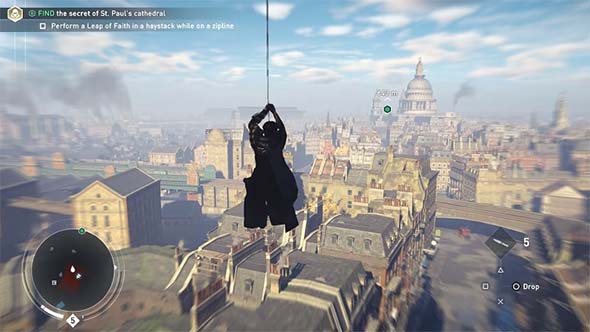
Many open world games have large, expansive maps that mostly feel empty and pointless,
as the player rushes through them simply to get to the next map marker or checklist item.
But now that I've established what I see as a problem, I want to focus on positive feedback. In this discussion, I'm going to look at a handful of games that should serve as inspirations for would-be open world developers. Ironically, some of these games aren't even open world games, but they still pose valuable lessons for how games that are open world could better use their game spaces. That isn't to say that the games discussed here are perfect. In fact, many of them have their own major flaws. But each of them has some element of design that utilizes the actual game map as a component of active play, rather than just a space in which game sequences exist. First, let's take a look at a game that was re-made recently, and use it as a "before and after" case study of map design... [More]
75d0658b-0278-43f3-a9e5-d3df3d01939d|4|4.3
Tags:open world, map, traversal, travel, cartography, geography, narrative, ludonarrative, ludonarrative dissonance, quest, vehicle, driving, racing, exploration, wasteland, survival, resources, Ubisoft, Bethesda, Resident Evil, Metal Gear Solid V: the Phantom Pain, Assassin's Creed, The Elder Scrolls, Skyrim, The Witcher 3, Grand Theft Auto, Grand Theft Auto V, Grand Theft Auto: San Andreas, Shadow of Mordor, Fallout, Fallout: New Vegas, Wasteland 2, Mad Max, Miasmata, Assassin's Creed IV: Black Flag, Burnout: Paradise, Shadow of the Colossus, Dark Souls
I wrote a lengthy blog late last year about the stagnant, "limbo"-like feel of most open world games' narratives. I had written that blog mostly before I played Metal Gear Solid V, and so I wasn't able to incorporate my thoughts regarding that game into the blog. But I did come to a new realization about open world gaming while I was playing MGSV. In my review of that game, I noted that:
"Even the open world itself feels constrained, as sheer cliffs prevent you from travelling too far off of the roads and serve to functionally railroad the player towards the small set-piece outposts and villages."
- from my Metal Gear Solid V: the Phantom Pain review
I realized while playing MGSV that the game had built this large, open world (well, two large, open worlds really, but I hadn't gotten that far yet), but it didn't really care to let the player actually traverse that space or use it in any meaningful way other than scavenger hunting for collectibles. At least those collectibles felt relevant to gameplay though! Roughly half the map is dead space that the player can't even access. There was also this strange focus on using the helicopter to drop in and drop out of missions, rather than actually living in the game world, as the character had to do in Snake Eater. The map started to feel less and less like a place, and more like a convoluted mission-select screen. At first, this seemed like a strange, isolated example of an open world game that really doesn't want the player actually exploring its world. But as I thought about it, I realized that this isn't really a new phenomenon; it's actually just a very extreme example of what has become a sort of defacto state in most open world games.
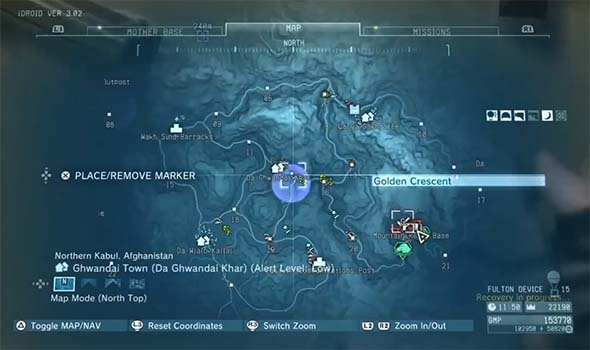
The Afghanistan map of Metal Gear Solid V feels heavily constrained by sheer cliffs.
Think about it this way: in a linear game with rooms and corridors, every hallway and room should serve some purpose or function. In most games, this function will be some kind of skill or system mastery test. An action game like Devil May Cry will throw enemies at you to fight; a puzzle game like Portal will have a puzzle (or a piece of a puzzle) in the room to solve; a stealth game like Metal Gear Solid 3 will have a sneaking challenge or obstacle to pass; and so on. In the best games, each of these challenges will also provide a unique or novel test of skill or system mastery: unique combinations of enemies, unique puzzles, or novel arrangements of enemies and obstacles. Other games can use those rooms for thematic or narrative purposes. A survival horror game like Resident Evil or Silent Hill will usually put enemies, puzzle items, or supplies in a room, but some rooms might instead contain a scripted scare. In some cases, a room might even be left completely empty in order to build some kind of tension or anticipation, or to delay the release of already-built tension or anticipation.
So what is the gameplay purpose of an open world map? ... [More]
d6e62cdb-b171-437a-b1a7-107859c9c818|4|4.5
Tags:open world, sandbox, game design, map, paradox, traversal, travel, cartography, geography, narrative, ludonarrative, ludonarrative dissonance, quest, exploration, driving, racing, vehicle, Ubisoft, Bethesda, Beenox, Metal Gear Solid V: the Phantom Pain, Assassin's Creed, the Amazing Spider-Man, Spider-Man, web-swinging, The Elder Scrolls, Skyrim, The Witcher 3, Fallout, Mad Max, Far Cry
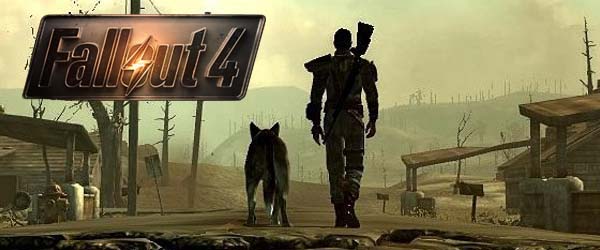
"Pirate Lord Captain Gregle, Slayer of Ancients and World-Renowned Trapeeze Artist" sounds like a pretty legendary character, right? Well, he wasn't. In fact, he was a very lucky, over-achieving halfling rogue in a short-lived campaign of Dungeons & Dragons. I rolled for the character's initial stats, got fairly low constitution, and then rolled the minimum value for hit dice for the first few levels. The result was a sixth-level character with a pathetic sixteen max hit points! A single lucky shot from virtually any enemy could be an instant KO for that character, and getting engaged in melee would practically be a death sentence. While some power gamers may scoff at the idea, rage against their dice, and then remake their character with a standard array and average HP, I decided to run with it and role play the hell out of little Gregle.
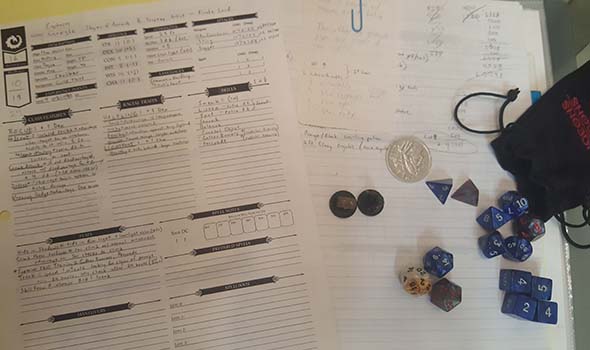
Character sheet for "Pirate Lord Captain Gregle, Slayer of Ancients and World-Renowned Trapeeze Artist"
With the low initial constitution, I focused my character around stealth abilities, disengagement and evasion tactics, and ranged attacks, and continued to improve those skills as I leveled. Knowing that he's a pathetic weakling, Gregle overcompensated by being a very flamboyant braggart and narcissist (I took inspiration from Stephen Colbert), and thought that he was more charming than he actually was. He routinely hid in the shadows, taking pot shots at vulnerable enemies and racking up kill steals from afar while his two warrior companions did most of the heavy-lifting. He would occasionally disarm a trap or unlock a door, and once used a clever trick to pacify (and subjugate) an entire band of pirates. He then took credit for much of the party's achievements.
Despite having only slightly above average charisma, he leaned on his halfling luck to succeed on some charisma checks and make himself a bit of a celebrity with the local townies for his exaggerated heroics. He reveled in the unprecedented access to their community that the locals provided, and he reveled in the adulant gifts that they showered upon him, happily hoarding it all in his bag of holding. The other party members never called him out on it in public, since they were just happy to have the cooperation of the locals.
While the other players and DM enjoyed Gregle's antics, their characters only barely tolerated his presence. During the actual adventuring, he was constantly getting into trouble and needing to be bailed out by his fellow adventurers. He once falsely awakened the party during his night watch after mistaking a wyvern for a dragon. In another instance, he was KO'd while using spider-boots to walk up a ceiling to pursue an enemy that had climbed a rope to escape the conflict, and he became stuck on the ceiling, forcing the party to figure out a way to get him down. They reluctantly obliged to help him, since Gregle was the possessor of the party's bag of holding, and was actually good at sneaking around to perform recon, unlocking doors, disarming traps, coming up with clever plans to avoid direct conflict, and other appropriately roguish things.
Gregle was one of the most fun characters that I've ever played, and he provided me with one of my most entertaining gaming experiences. This is the power of role playing to a character's strengths and weaknesses. It's a power that Bethesda shows no interest in utilizing for Fallout 4.
Out of the vault and into the wastes
I have to give credit to Bethesda for making one really interesting decision with Fallout 4: the game starts in a time period prior to the Great War that triggered the nuclear holocaust, and so it explores as yet unseen elements of the series' backstory. Or at least, it does for all of fifteen minutes. Much like Fallout 3, the pre-war gameplay and time that you spend in the vault is really just an extended tutorial and character-creation process. But unlike Fallout 3, it doesn't give enough time and depth to those settings to make the player legitimately care about them or the characters in them.
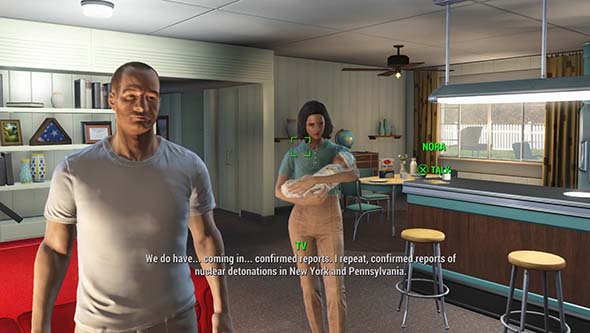
You don't spend enough time in your pre-war home or vault to develop any attachment to the place or people.
After creating your character and setting your S.P.E.C.I.A.L. stats, you and your spouse immediately flee with your infant child to the neighborhood vault. Once inside, you're handed the trademark silly superhero pajama jumpsuit and then promptly cryogenically frozen. You awake to witness your spouse get murdered and child kidnapped by apparent raiders, but then get frozen again. Then you awake again to do the combat tutorial against radroaches before leaving the vault and starting the game proper.
You spend virtually no time in the pre-war time period; you don't bond at all with your spouse or child; you don't establish any connections with your home or neighbors. There is absolutely no emotional bond between the player and what is lost in the war. So when the game drops you in the wasteland with a dead spouse, a missing child, and a quest to track down the kidnapper/killer, it does so without creating any emotional connection or investment for the player. I could go to Concord and then to Diamond City and search for my son, or I could just wander off in any random direction fighting raiders and painstakingly building my own little settlement out in the middle of nowhere using salvaged car tires and scrapped raider armor. Fallout 4 doesn't waste any time taking a nose-dive into the open world limbo.
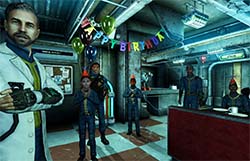
Fallout 3 simulated an entire childhood in the
vault, with friends, family, and even bullies.
Compare this against Fallout 3's prologue. It spent a considerably longer time developing your character and immersing you in the vault. Your dad (voiced by Liam Neeson) plays with you as a baby to teach movement and camera controls, he teaches you how to shoot, and throws a surprise birthday party for you. You interact with a childhood friend, other vault dwellers, and even a bully in order to tutorialize persuasion and speech checks and learn how to solve conflicts without violence. You even go to school and take a test to determine your default skills. In the short amount of time in the vault, you've lived a montage of an entire life.
With only a little bit of buy-in from the player, Fallout 3's Vault 101 becomes a living, breathing place populated with people who you can relate to and care about. You, as a player, have an investment in it and the characters that inhabit it. So when shit happens and you have to leave the vault, it's a monumental moment, and the events of your life, and the decisions that you've made, will shape your character's development over the rest of the game.
Even Skyrim gave the player interesting role-play decisions in its tutorial by required your character to make an immediate decision to follow the imperials or the Stormcloaks (though the scenario makes that decision a pretty one-sided one). And your initial choices of weapons and battle tactics would level up those specific skills; thus, starting the character down a path towards specializing in those skills as the game progressed (though you were completely free to change all that if you want).
And Fallout 4 has a perfect opportunity to take that father / son dynamic from Fallout 3, and invert it! The game could have opened with the birth of the baby. Since Bethesda had to record dialogue for multiple names for the player character, they could just as easily have done the same with the child's name. The doctor could hand you a paper with "This Year's Popular Baby Names", and you could chose one of those names that were explicitly recorded in dialogue. You could even be given the option to type your own name and replace the child's name with "my son" in dialogue. You could fill out the child's name and your own character's name on the birth certificate. Naming the baby would create a sense of ownership and connection to the child that might help encourage the player to pursue the main quest.

Fallout 4's vault serves only as a combat tutorial with no depth, emotional resonance, or meaningful decisions.
But it doesn't have to stop there... [More]
0b31d11f-77e0-4ddd-b277-8b1e013b818d|0|.0
Tags:Fallout, Fallout 4, Bethesda, RPG, Boston, commonwealth, minuteman, minutemen, wasteland, post-apocalypse, nuclear weapon, nuclear war, NPC, Dogmeat, power armor, crafting, ludonarrative dissonance, open world, sandbox, raider, synth, android, slavery, underground railroad, freedom, rights, morality, ethics, family
|

| 12 | | | | | | | 60 | | 11 | | | | | | | 55 | | 10 | | | | | | | 50 | | 09 | | | | | | | 45 | | 08 | | | | | | | 40 | | 07 | | | | | | | 35 | | 06 | | | | | | | 30 | | 05 | | | | | | | 25 | | 04 | | | | | | | 20 | | 03 | | | | | | | 15 | | 02 | | | | | | | 10 | | 01 | | | | | | | 05 |
|